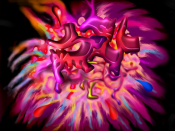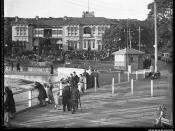~ The Not-So-Topia ~
The utopia - man's greatest and seemingly unreachable goal. Throughout history, humanity has striven to perfect the world by instilling such peace and harmony into the human race as to reach the consciousness that is a utopia. The unquenchable desire for world peace; attempts to abolish the use of nuclear, and sometimes all, weapons; total equality; even the Holocaust was a disillusioned man's attempt to create the dreamed goal. However, even if acquiring such an end was possible, it would require the abolition of everything that makes one human - individualism, love, and freedom - thus destroying humanity as we know it. In such a case, it would be debatable if a utopia had indeed been created. Therefore, as it is impossible to create a true utopia, the society envisioned by Huxley can certainly not be a utopia.
It has been quoted by many wise people that it's our imaginations that make us human.
Without imagination, it is impossible to create a unique individual of ourselves as one cannot envision oneself in a different sense than the present. Even such an abstract concept as an imagination would be unable to conceptualize without the presence of itself. However, in this "brave" new world of artificial lights and test tubes, the citizens have somehow lost this precious gift. Whether by conditioning or in their blood surrogate, it matters not, for it does not exist, except in the mind of the people worthy of the islands. After the eradication of imagination, and therefore individualism, the conditioning of the masses is a simple task of repetitive messages (in this case, the use of hypnopaedia and propaganda) to easily create conformity. Even Watson himself created propaganda to even out the masses into one homogeneous race. However, to achieve the peaceful state...


